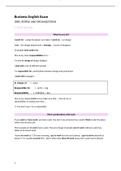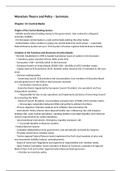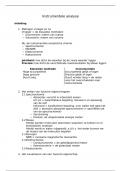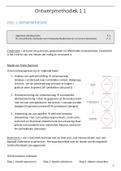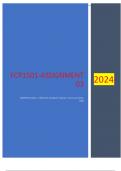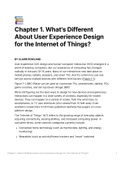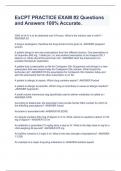Business English Exam
JOBS, PEOPLE AND ORGANIZATIONS
1. Work and jobs
What do you do?
I work for - a large European car maker. I work on – car design
I run – the design department. I manage - a team of designers
20 people work under me
One of my main responsibilities is to …
I’m also in charge of design budgets
I deal with a lot of different people
I’m responsible for coordination between design and production
I work with managers
In charge of + noun
Responsible for + verb + -ing
Responsibility + infinitive / -ing
One of my responsibilities is to make sure that … One of my re-
sponsibilities is making sure that …
!!! You don’t say: I’m a responsible!
Work combinations with work
If you work or have work you have a job. You don’t say someone has a work! Work is also the place
where you do your job.
More people are in work (have a job). The percentage of people out of work (without a job) has
fallen to its lowest level.
I leave for work at 7.30 every morning. I go to work by train and subway. I get to/arrive at work at
about 9. I’m usually at work till 6. I don’t often take time off work (away form work due to illness).
1
, lOMoARcPSD|10125059
Types of job and types of work
A full-time job = works full-time
A part-time job = works part-time
A permanent job = permanent work
A temporary job = temporary work
2. Ways of working
Working hours
I’m an office worker
It’s a nine-to-five job with regular working hours
I need my swipe card to get into the office
You can also say clock in and clock out
Flexitime (= BrE)
Flexitime = means we can work when we want, within certain limits
I work in shifts and I have to clock on and clock off at the beginning and the end of every shift. I may
be on the day shift one week and the night shift the next week.
When the company is selling lots of cars, they ask us to work overtime (more hours than usual for
more money).
A lot of people in my department commute to work every day. I work from home and avoid long
journeys that some commuters experience every day. That’s the benefit of teleworking or telecom-
muting (working from home and using the computer and phone to communicate with other people).
Nice work if you can get is
All these words are used in front of job and work.
Satisfying, stimulating, fascinating, exciting = the work is interesting and gives you positive feel-
ings.
Dull, boring, uninteresting, unstimulating = the work is not interesting
Repetitive, routine = the work involves doing the same thing again and again
Tiring, tough, hard, demanding = the work is difficult and makes you tired
2
Gedownload door Shirley VK ()
, lOMoARcPSD|10125059
Nature of work
My work involves + noun:
Human contact
Long hours
Teamwork
I like/dislike/prefer/enjoy + -ing: working with figures, dealing with customers, solving problems
4. Skills and qualifications
Education and training
The trouble with graduates (people who’ve just left university) us that their paper qualifications
are good. They might have qualifications in interesting subjects, but they have no work experi-
ence.
Education should teach people how to think, not train them for a particular job. One of last year’s re-
cruits graduated from Oxford University with a degree in philosophy.
It’s more useful to do training in a particular subject. It’s better for us if you train as a scientist and
qualify as a biologist or a doctor.
We also need good managers, which we can achieve through in-house training
(courses within the company). You know we put a lot of money into management devel-
opment, where managers regularly go on acquire experience (get knowledge through do-
ing things).
A master’s degree = a qualification you can get after one or two years of graduate study.
A Mater’s of Business Administration (MBA) = a master’s degree in advanced business studies.
Skilled and unskilled
A skill = a particular ability to do something well, especially because you have learned and practiced
it.
Jobs, and the people who do them, can be described as:
Highly skilled = car designer
Skilled = car production manager
Semi-skilled = taxi driver
Unskilled = car cleaner
You can say that someone is:
3
, lOMoARcPSD|10125059
Skilled at + noun = Customer care electronics
Skilled in + -ing = Communicating using Excel
Good with:
Computer
Figures
People
The right person
These words are often used in job advertisements. Companies look for people who are:
Methodical, systematic and organized = working in a planned, orderly way
Computer-literate = good with computers
Numerate = good with numbers
Motivated = very keen to do well in their job, because they find it interesting
Talented = very good at what they do
Self-starters = they must be proactive, self-motivated or self-driven (good at working on their own)
Team players = people who work well with other people
Self-starter and team player are nouns. The other words are adjectives.
6. People and workplaces
Employees and management
The people who work for a company are on its payroll. They are its employees, personnel, staff,
workers or workforce. These words can also refer just to the people carrying out the work of a com-
pany, rather than the management (those leasing and organizing the company).
Workforce, work-force and work force are all possible.
Management and administration
A company’s activities may be spread over different sites in different places. A company’s most
important managers usually work in its head office or headquarters (HQ). Some managers have their
own individual offices, but often employees work in open-plan offices (large areas where many
people work). Administration or, informally, admin (the ordinary work supporting a company’s
activities) is often done in offices like these by administrative staff or support staff. For example,
those giving technical help to buyers of the company’s products, are in technical support.
4
Gedownload door Shirley VK ()


